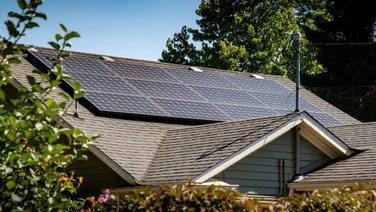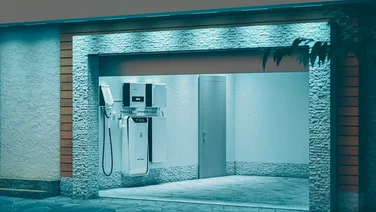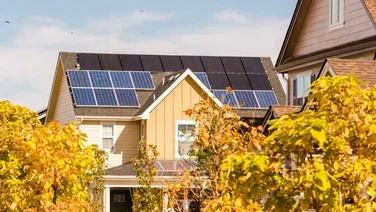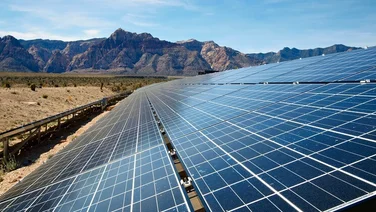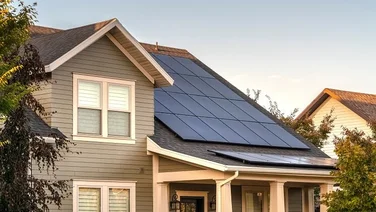✔ Solar panels can last at least 25 years with proper maintenance
✔ After around 20 years, most solar panels still operate at 90% capacity
✔ Solar panels become less efficient at temperatures above 149° Fahrenheit
Solar panels can save you money in the long run by reducing your energy bills. But to get a good return on investment, you need to make sure that your solar panels last more than 10 years – the time it takes for the average American household to break even, according to Solar.com.
Luckily for you, most solar panels will last much longer than 10 years, though how long exactly will depend on the model and manufacturer, and how well you take care of them.
Want to make sure your panels have a long and fruitful life? Read on to find out everything you need to know.

What’s the average lifespan of a solar panel?
The average lifespan of a solar panel is between 25 and 30 years, depending on the manufacturer and how well you look after your system.
Over time, solar panels become less efficient, which will have an impact on their output capacity (the total amount of electricity they can generate). This means that solar panels will gradually produce slightly less electricity as time goes on.
The ‘rate of degradation’ of a solar panel refers to how fast this process happens.
Luckily, solar panels have a low rate of degradation – efficiency and output decrease at a rate of roughly 0.2%–0.3% per year. This means that by the end of their lifespan, solar panels still operate at around 90% of their capacity.
Is solar panel longevity improving?
Solar panel longevity has improved a lot in the past two decades, and is continuing to do so.
A study by the National Renewable Energy Laboratory (NREL) found that solar panels manufactured before the year 2000 had an average degradation rate of around 1% per year. At this rate, solar panels would have operated at about 80% of their original capacity after 25 years.
In contrast to this, solar panels manufactured after 2000 had an average degradation rate of around 0.4%. This means that they retain about 90% of their original capacity after 25 years. So, solar panel longevity really has improved a lot in a very short space of time.
Why does a solar panel eventually stop working?
Solar panels eventually stop working due to exposure to natural elements. According to research by the NREL, the main causes of solar panel degradation include extreme temperature – solar panels are less effective above 77°F –, and high humidity, which can cause water droplets to accumulate on your solar panels.
Debris, or the accumulation of snow, dust, or dirt on your panels can also contribute to degradation. These items can scratch solar panels, reducing their longevity.
Over time, exposure to natural elements will make the cells in your solar panels less efficient. They can also wear on to other parts of your solar panel system, such as your junction box where wiring is stored.
It’s also worth noting that some parts of your solar panel system are more susceptible to weathering, and need to be replaced sooner than the panels. For example, the solar inverter typically needs replacing after 10 to 15 years, rather than 25 to 30.
Want to know more? Read our article How Do Solar Panels Work?
Is hot weather bad for solar panels?
Hot weather is generally bad for solar panels because it makes them less efficient – but this will depend on how hot the weather is. If a solar panel gets hotter than 149 Fahrenheit (°F), its efficiency levels will decrease.
The ideal temperature for maximum solar panel efficiency is between 59°F and 95°F.
Most solar panels are tested at 77°F (25°Celsius), and manufacturers will use this to provide a ‘temperature coefficient,’ which is measured in Celsius (°C). This lets you know by how much a solar panels’ efficiency and output will decrease when the temperature goes above 77°F.
If a solar panel’s temperature coefficient is -0.285 per degree Celsius, this means that it’ll lose 0.285% of its efficiency for every degree it goes above 25°C (77°F).
If you live in a hot state, such as Arizona or Texas, there are things you can do to limit the negative effects of extreme heat on your solar panels:
- Mount your panels a few inches above your roof to help with airflow
- Choose panels that have a better temperature coefficient, such as thin film panels – although, bear in mind that these have a lower efficiency rating than monocrystalline or polycrystalline solar panels
- Choose panels that are made of a light colored material, since this will absorb less heat
- Make sure other components of your solar panel systems, such as inverters, are kept in the shade
Learn more: Do solar panels work in cloudy weather?

Top tips for making your solar panels last as long as possible
Choose a good manufacturer and installer
Make sure you choose an installer that can provide you with good-quality solar panels. It’s also a good idea to make sure they include a warranty of 25 years or more on the panels, and that they install your solar panel system correctly.
This is important because incorrectly installed solar panels can degrade at a faster rate.
Keep your panels clean and free of debris
Keep your solar panels free from dirt, dust, snow, or debris, so that they have maximum efficiency.
You typically only need to clean your solar panels twice a decade, but this will depend on where you live. For example, if you live in an area that has a dry and dusty climate, or one that gets a lot of snow in the winter, you’ll need to clean your panels more often.
Have a professional do annual maintenance checks
Hire a professional to carry out annual maintenance checks, which will involve locating and fixing any small issues, such as cracks, exposed wires, or loose brackets, before they become a bigger problem.
Bear in mind that this will add to the total cost of your solar panels, since most installers don’t include maintenance checks in the cost of installation.
However, if your solar panels develop any major issues before your warranty is up, these should be covered by your installer.
What’s the average warranty on a solar panel?
The average warranty on a solar panel is between 10 and 25 years, depending on the model and the manufacturer.
This means the manufacturer will guarantee that your solar panels will function at around 90% of their original capacity after 10 years, and around 80% after 25 years.
Other parts of your solar panel system will usually have different warranties. For example, solar batteries and inverters usually have a 10-year warranty, since they degrade faster than panels.
If you want to know how much a solar battery costs, read our article to find out everything you need to know.
Summary
Solar panels can last up to 30 years. During that time, the efficiency and output of your solar panels will decrease a little, but they’ll still be able to operate at between 80% and 90% of their original capacity.
You can save you money over time with solar panels, since they’ll reduce your energy bills. The average break-even point is at around 10 years – and given that panels can last another 15 years after that, you’ll get a pretty good return on investment.
Need more solar panel questions answered? Take a look at our page, How Many Solar Panels Do You Need.
